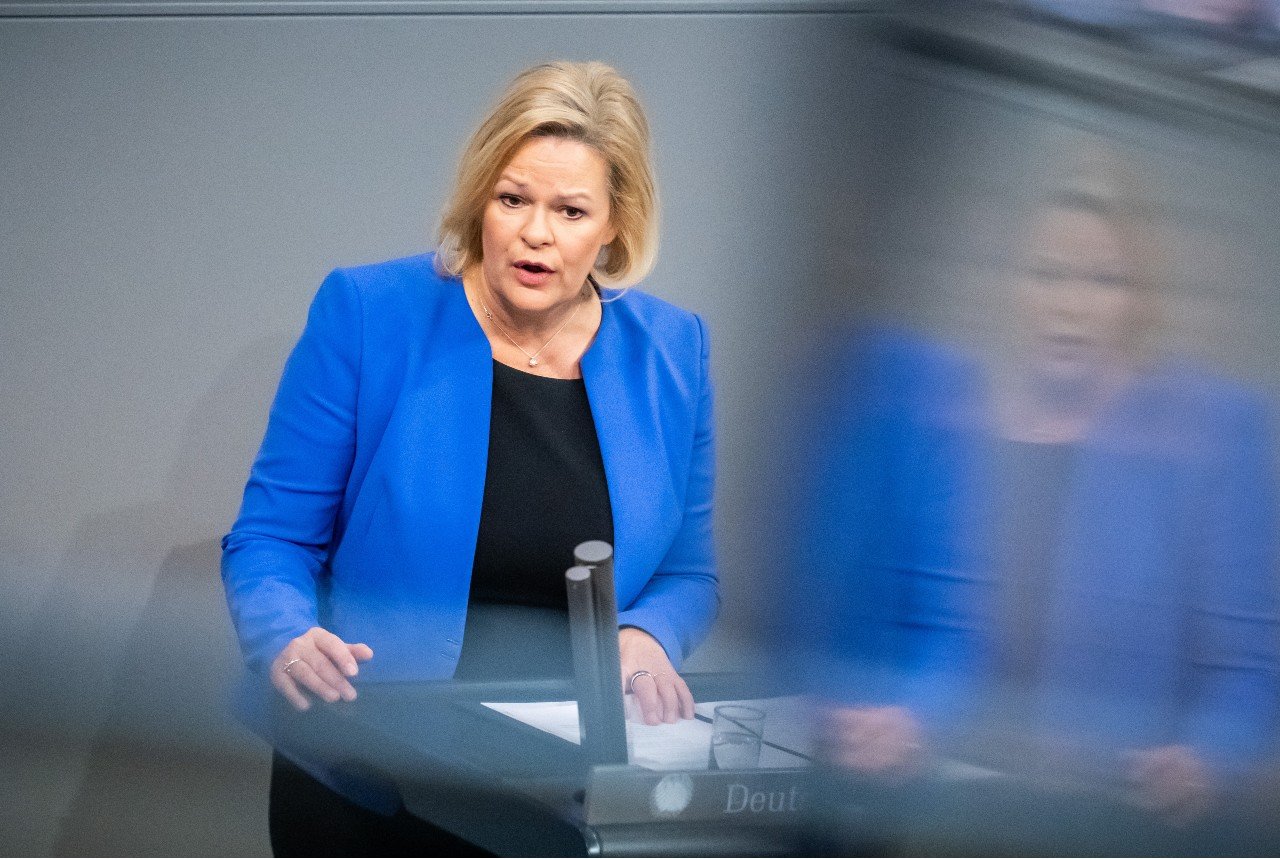Amid the rows of empty seats at Thursday’s thinly-attended debate, German politicians from all parties clashed over the government’s planned reforms to citizenship.
It was the first of three readings that the dual nationality bill will face before being put to a vote in the Bundestag, but it took just a few minutes of debating time for tempers to fray.
As Interior Minister Nancy Faeser (SPD) stood up to introduce the law, opposition MPs from the right-wing CDU and far-right AfD continued to heckle from the sidelines.
“Screaming won’t make it any better,” Faeser shot at CDU MPs as she attempted to set out the need to reform Germany’s longstanding citizenship laws.
Following the skilled worker immigration law that was passed earlier this year, the reform of citizenship laws is the “next necessary step” towards making Germany a country of immigration, Faeser said.
READ ALSO: INTERVIEW – ‘We are determined to pass German citizenship reforms despite delays’
“We will only win the battle for skilled workers if we offer the chance to become a full participant in German society,” she emphasised.

Citizenship reform, including the right to hold more than one passport, is the route to making Germany “stronger, more modern and better able to compete internationally,” she said.
The reforms are a message, Faeser added, that “effort pays off, hard work pays off, integration pays off”.
The Interior Minister’s words were met with a scathing response from CDU politician Alexander Throm, who accused the government of “endangering the peace” by enabling people to naturalise after just three or five years when they may not be fully integrated.
“This isn’t a modern citizenship law,” Throm said. “It’s a citizenship devaluation law.”
Looking directly at Faeser, the CDU politician said that skilled workers wanted quicker turnaround times on visas, easier family reunification, digitalisation and better housing options, not lower hurdles for citizenship.
Repeating a well-worn conservative attack-line, Throm also accused the government of driving Germany towards the far-right with its liberal approach to immigration.
“Laws like this divide our country and make parties like the AfD more popular,” he argued.
‘No ifs or buts’ on anti-Semitism
Though many of the talking points brought up in Thursday’s debate had been raised before, much of the focus this time around was on the issue of anti-Semitism and how the government plans to tackle it.
Since Hamas’ October 7th terrorist attack on Israel, Germany has seen a rise in anti-Semitic hate crimes and incidents – an issue that led to the debate on the citizenship being briefly removed from the parliamentary agenda.
In her opening speech, Faeser dedicated several minutes to outlining the government’s “zero-tolerance” approach to anti-Semitism and racism.
“Let me be clear: anyone who engages in anti-Semitic behaviour cannot become German,” she said.
READ ALSO: How Germany wants to toughen up dual citizenship law around anti-Semitism
Though no firm amendments to the citizenship bill have yet been made, parliamentary sources have told The Local that the Free Democrats (FDP) are pushing for tighter rules around anti-Semitism in the wake of October 7th.
This could include a declaration acknowledging Israel’s right to exist.
In a possible nod to this, the Interior Minister said she considered a denial of Israel’s right to exist an act of anti-Semitism and was open to toughening up the law in this regard.
The subject of anti-Semitism was also raised by Justice Minister Marco Buschmann (FDP), who said the citizenship reforms were about deciding who Germany wanted to be rather than clinging to “comfortable illusions”.

One of these illusions, he said, was that everyone who lives here automatically shares German values.
Buschmann said that in future, trivial offences that have been recorded by the police will be investigated to find out if there were racist or anti-Semitic motives behind them as part of the citizenship process.
An enraged response came from CDU politician Philipp Amthor, however, who argued that the government was “moving in the wrong direction” when it came to “imported anti-Semitism”.
Arguing that anti-Semites should be stripped of their German citizenship, he said: “You’re promoting naturalisation of the wrong people when you should be expatriating the right people.”
As the bill makes its way through the Bundestag in the coming weeks, the CDU will “fight it with all our might”, Amthor warned.
READ ALSO: Could Germany strip citizenship rights from foreigners over anti-Semitism?
‘Best evidence of loyalty’
A gentler tone came from Greens politician Filiz Polat, who is one of the rapporteurs working on the bill.
Polat pointed out that 11 million people currently live in Germany without a German passport, 1.7 million of whom were born in the country and have spent their entire lives here.
“This stark inequality within the population between those who can vote and those who live here creates feelings of exclusion,” she said. “And it’s also, as the Constitutional Court has said, questionable for a democracy.”
One of the people who grew in Germany and spent decades unable to vote was Gülistan Yüksel of the SPD.
She said she had arrived in Germany as the daughter of a Turkish immigrant at the age of eight and immediately felt welcome, but later changed her mind when she realised she was shut out of several parts of life in Germany, including elections.
She finally naturalised in her mid-30s after 28 years in the country. “Citizenship is the best evidence of loyalty,” she said.
“But hearing the debate today, I’m glad I didn’t know about any of this back then, because otherwise I have no idea if I’d even be standing here now.”



 Please whitelist us to continue reading.
Please whitelist us to continue reading.
Member comments